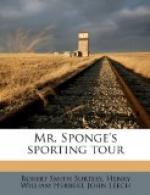Sir Harry Scattercash’s were only an ill-supported pack of hounds; they were not kept upon any fixed principles. We do not mean to say that they had not plenty to eat, but their management was only of the scrimmaging order. Sir Harry was what is technically called ‘going it.’ Like our noble friend, Lord Hard-up, now Earl of Scamperdale, he had worked through the morning of life without knowing what it was to be troubled with money; but, unlike his lordship, now that he had unexpectedly come into some, he seemed bent upon trying how fast he could get through it. In this laudable endeavour he was ably assisted by Lady Scattercash, late the lovely and elegant Miss Spangles, of the ‘Theatre Royal, Sadler’s Wells.’ Sir Harry had married her before his windfall made him a baronet, having, at the time, some intention of trying his luck on the stage, but he always declared that he never regretted his choice; on the contrary, he said, if he had gone among the ‘duchesses,’ he could not have suited himself better. Lady Scattercash could ride—indeed, she used to do scenes in the circle (two horses and a flag)—and she could drive, and smoke, and sing, and was possessed of many other accomplishments. Sir Harry would sometimes drink straight on end for a week, and then not taste wine again for a month; sometimes the hounds hunted, and sometimes they did not; sometimes they were advertized, and sometimes they were not; sometimes they went out on one day, and sometimes on another; sometimes they were fixed to be at such a place, and went to quite a different one. When Sir Harry was on a drinking-bout they were shut up altogether; and the huntsman, Tom Watchorn, late of the ‘Camberwell and Balham Hill Union Harriers,’ an early acquaintance of Miss Spangles—indeed, some said he was her uncle—used to go away on a drinking excursion too. Altogether, they were what the country people called a very ‘promiscuous set.’ The hounds were of all sorts and sizes; the horses of no particular stamp; and the men scamps and vagabonds of the first class.
With such a master and such an establishment, we need hardly say that no stranger ever came into the country for the purpose of hunting. Sir Harry’s fields were entirely composed of his own choice ‘set,’ and a few farmers, and people whom he could abuse and do what he liked with. Mr. Jogglebury Crowdey, to be sure, had mentioned Sir Harry approvingly, when he went to Mr. Puffington’s, to inveigle Mr. Sponge over to Puddingpote Bower; but what might suit Mr. Jogglebury, who went out to seek gibbey sticks, might not suit a person who went out for the purpose of hunting a fox in order to show off and sell his horses. In fact, Puddingpote Bower was an exceedingly bad hunting quarter, as things turned out. Sir Harry Scattercash, having had the run described in our two preceding chapters, and having just imported a few of the ‘sock-and-buskin’ sort from town, was not likely to be going out again for a time;




